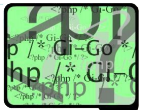Lecture 1. An ICT role in key sectors of development of society. Standards in the field of ICT.
Purposes: support the use of ICT as an integral part of the provision of quality education for all. They should advocate for the use of ICT in education as a key modern aid to learning.
plan:
Definition of ICT;
Subject ICT and its purposes;
An ICT role in key sectors of development of society. Standards in the field of ICT.
Definition of ICT.
ICT is the technology required for information processing, in particular, the use of electronic computers, communication devices and software applications to convert, store, protect, process, transmit and retrieve information from anywhere, anytime.
Information refers to the knowledge obtained from reading, investigation, study or research. Information is knowledge and helps us to fulfill our daily tasks. For example, forecasting the stock exchange market. Communication is an act of transmitting messages. It is a process whereby information is exchanged between individuals using symbols, signs or verbal interactions.
Technology is vital in communication.
Aiding Communication
Telephone and fax machines are the devices used in extending communication.
Spreading Information
To broadcast information such as news or weather reports effectively. Radio, television, satellites and the World Wide Web (www) are powerful tools that can be used

Fugure 1.1 - Technology is vital in communication
Subject ICT and its purposes.
The purpose of ICT - production information for its analysis of the man and the adoption of its solutions based on the implementation of any action.
The object of study of informatics is:
information;
informational resources.
Subject Computer Science consists of the following concepts:
Hardware computer equipment;
Software of computer equipment;
means of interaction of hardware and software;
a means of human interaction with the hardware and software.
The main objective is to systematize information science techniques and methods of work with the hardware and software of computer technology. The aim is to systematize the selection, implementation and development of advanced, most efficient technology, automation steps to work with the data, as well as methodological support of new technology research.
An ICT role in key sectors of development of society.
The potential of ICT as a development tool rests on its ability to improve the way people do things. The rapid changes and advancements in modern technology present a unique opportunity for developing countries to leapfrog intermediate steps in development while improving the quality and broadening the reach of public services.
Telecommunications
ADB support for telecommunications and ICT is changing lives across the region. Farmers and fisher folk receive timely weather forecasts through their mobile phones, remote village schools connect to educational resources through internet -enabled computer labs, and citizens transact with their governments more efficiently through online systems. ADB is also helping to expand telecommunication networks, provide shared ICT access facilities like Community e-Centers (CeCs), and develop innovative and relevant ICT applications.
ICT in Education
ICT can improve the efficiency and quality of education at all levels. Part of ADB's strategy to support itseducation policy principles is promoting "experimentation with, and dissemination of, innovative strategies and technologies in education." This involves developing appropriate e-applications to help DMCs leapfrog conventional means of learning and teaching .
ICT in Public Sector Management
ADB encourages governments to adopt both innovative approaches and modern technologies to promote good governance. This is done not just by shifting from manual, paper-based processes to automated systems, but also by creating new skills, building human and institutional capacity, and creating an enabling policy and regulatory environment to facilitate public sector reforms.
ICT in Health
ICT can be a powerful tool for improving health and related services. ADB projects are helping to improve dissemination of public health information, bridge the gap in consultation, diagnosis, and treatment between resource-rich and resource-poor hospitals, facilitate learning, enhance the ability to monitor diseases and other health issues, and make health administration more efficient.
ICT in Agriculture and Food Security
ADB’s ICT efforts are raising agricultural productivity and the quality of life of farmers and the rural poor by improving information flows, communication, and access to reliable, up-to-date information. This enables strategic decision-making by farmers and prevents or mitigates losses caused by natural disasters .
THE IMPACT OF ICT ON SOCIETY FASTER COMMUNICATION SPEED
In the past, it took a long time for any news or messages to be send. Now with the Internet, news or messages are sent via e-mail to friends, business partners or to anyone efficiently. With the capability of bandwidth, broadband and connection speed on the Internet, any information can travel fast and at an instant. It saves time and is inexpensive.

Figure 1.2 – lower Communication Cost
Using the Internet is cost-effective than the other modes of communication such as telephone, mailing or courier service. It allows people to have access to large amounts of data at a very low cost. With the Internet we do not have to pay for any basic services provided by the Internet. Furthermore, the cost of connection to the Internet is relatively cheap.
Computers are reliable. With the internet, information could be accessed and retrieved from anywhere and at anytime. This makes it a reliable mode of communication. However, the input to the computer is contributed by humans. If the data passed to the computer is faulty, the result will be faulty as well. This is related to the term GIGO. GIGO is a short form for Garbage In Garbage Out. It refers to the quality of output produced according to the input. Normally bad input produces bad output .

Figure 1.3 – Reliable Mode of Communication
With the advancement of ICT, information can be shared by people all around the world. People can share and exchange opinions, news and information through discussion groups, mailing list and forums on the Internet. This enable knowledge sharing which will contribute to the development of knowledge based society.

Figure 1.4 – Effective Sharing of Information
ICT technology has created the term paperless environment. This term means information can be stored and retrieved through the digital medium instead of paper. Online communication via emails, online chat and instant messaging also helps in creating the paperless environment.

Figure 1.5 – Paperless Environment
Internet offers fast information retrieval, interactivity, accessibility and versatility. It has become a borderless sources for services and information. Through the Internet, information and communication can be borderless.

Figure 1.6 – Borderless Communication
There are some negative effects of ICT. It has created social problems in the society. Nowadays, people tend to choose online communication rather than having real time conversations. People tend to become more individualistic and introvert.

Figure 1.7 – Social Problems